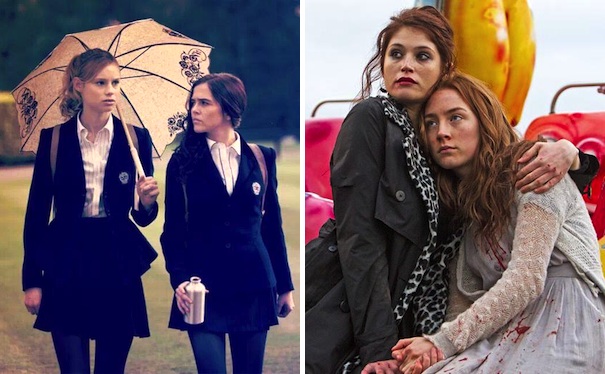Vampire Academy and Byzantium have two things in common. Each of them centres around a strong, vital relationship between two women: in Vampire Academy, this relationship is between adolescent best friends Rose and Lissa, while in Byzantium the central thread is the relationship between mother-daughter pair Clara and Eleanor Webb. They are also both films about supernatural creatures who require blood to survive—vampires, although Byzantium never uses the word.
In all other respects, they are radically different films. Vampire Academy is an adaptation of Richelle Mead’s YA novel of the same name. The film opens with Rose and Lissa on the run from the supervision of their boarding-school for vampires because of some unspecified threat to Lissa—and half-vampires, the dhampir who act as bodyguards to the “Moroi,” the good vampires (who have magic). Brought back to school by the fancy Russian bodyguards who apparently serve as Vampire Truancy Patrol, they’ve got all the worst parts of American high school to contend with, as well as evil vampires (“Strigoi”) who’re out to drink good-vampire blood, dynastic politics, seeing through your best friend’s eyes (literally), rumours about teenage sexual activity, and the creepy-yet-disturbingly-attractive-boy with dead parents who hangs out in the church attic.
It’s a really entertaining bad film, the kind of adaptation that takes everything from the book—yes everything and the kitchen sink too—and finds a place for it in the film regardless of whether or not it can be explained or adequately introduced in 104 minutes of running time. While Lucy Fry turns in a solid performance as Lissa, Zoey Deutch is only intermittently convincing as smart-mouthed, rash, impulsive Rose. (Olga Kurylenko as Headmistress Kirova isn’t even trying.) And yet. There’s something immensely touching about this portrayal of best friends who have each other’s backs, even when they’re falling out with each other; who stick up for and protect each other, each in their own way. It’s a film that leaves me with warm fuzzy feelings—even if I did spend quite a bit of time giggling at the whole idea of TEENAGE VAMPIRE SCHOOL.
Byzantium is not a film to giggle at. Directed by Neil Jordan and based on a play by Moira Buffini, it’s one of the most impressive and compelling films I’ve had the privilege of watching.* Quietly eerie, with a slow build to a conclusion at once wrenching, inevitable, and triumphant, it is a film that has at its heart several deep arguments about patriarchal structures, predators, survival, connection and complicity. It is an emotionally complex film, full of stark moments and striking images. Its main character—or at least the character through whose eyes we’re invited most closely to see—Eleanor Webb (Saoirse Ronan) spends her life writing and re-writing the story, insofar as she knows it, of how she came to be what she is, and preying on old people who want to die. For Eleanor is an ethical predator: she insists her victims must consent. Ronan lends her role an air of stillness, of unutterable loneliness; a combination of clear-eyed self-knowledge and deep hunger for connection—a connection outside of the relationship she has with her mother/maker.
*And you should all go read Gemma Files’ take on the film, and her conversation with Sonya Taaffe in comments.
Clara Webb (Gemma Arterton) is fiercely protective of her daughter, but otherwise a chameleon: moving through the world preying on men who lust after and/or underestimate her. She keeps secrets, not telling even Eleanor what she’s so determined to keep her daughter safe from. (We learn that she failed to keep her daughter safe once, and it is impossible not to feel the implication that this failure haunts and enrages Clara in equal measure.) Her murders are pragmatic: she kills to live and to keep her daughter safe, and if Clara Webb is a monster it is because men have made her one. We hear her tell her own story in her own words once only—and it seems fitting that she reveals her life to a man whom, though he does not know it, she intends to kill immediately thereafter. Arterton brings to her performance a hard edge but also, in her character’s interactions with Eleanor, a vulnerability. Mother and daughter love each other but fail to understand each other.
Moments of change lie at the heart of the film: violation and transformation, death and rebirth. And I love it for Gemma Arterton and Saoirse Ronan, for the feminist nature of that central relationship, as much as for its striking visuals and directorial elegance.
Watch it. It’s brilliant.
Liz Bourke is a cranky person who reads books and occasionally watches films. Her blog. Her Twitter.










